Social Work Ethics: Professional Decision Making Case Study
VerifiedAdded on 2023/06/11
|9
|1841
|171
Case Study
AI Summary
This case study delves into the ethical dilemmas faced by a counselor dealing with Mona, a teenager grappling with guilt and self-harm following a house fire involving her grandmother and siblings. The study identifies the primary ethical issue as whether Mona should disclose her role in the events leading up to the fire. It examines the relevant professional ethical principles from the AASW Code of Ethics, including respect for persons, social justice, and professional integrity, and outlines the steps involved in ethical decision-making. Ultimately, the solution proposes an action plan focused on reassuring Mona and addressing her self-harming tendencies, drawing upon the concept of virtue ethics to emphasize the importance of benevolence and support in promoting overall well-being. The counselor is encouraged to act with professional integrity, apply their skills to the situation, and consider all relevant factors before making a decision, documenting the process and outcomes.
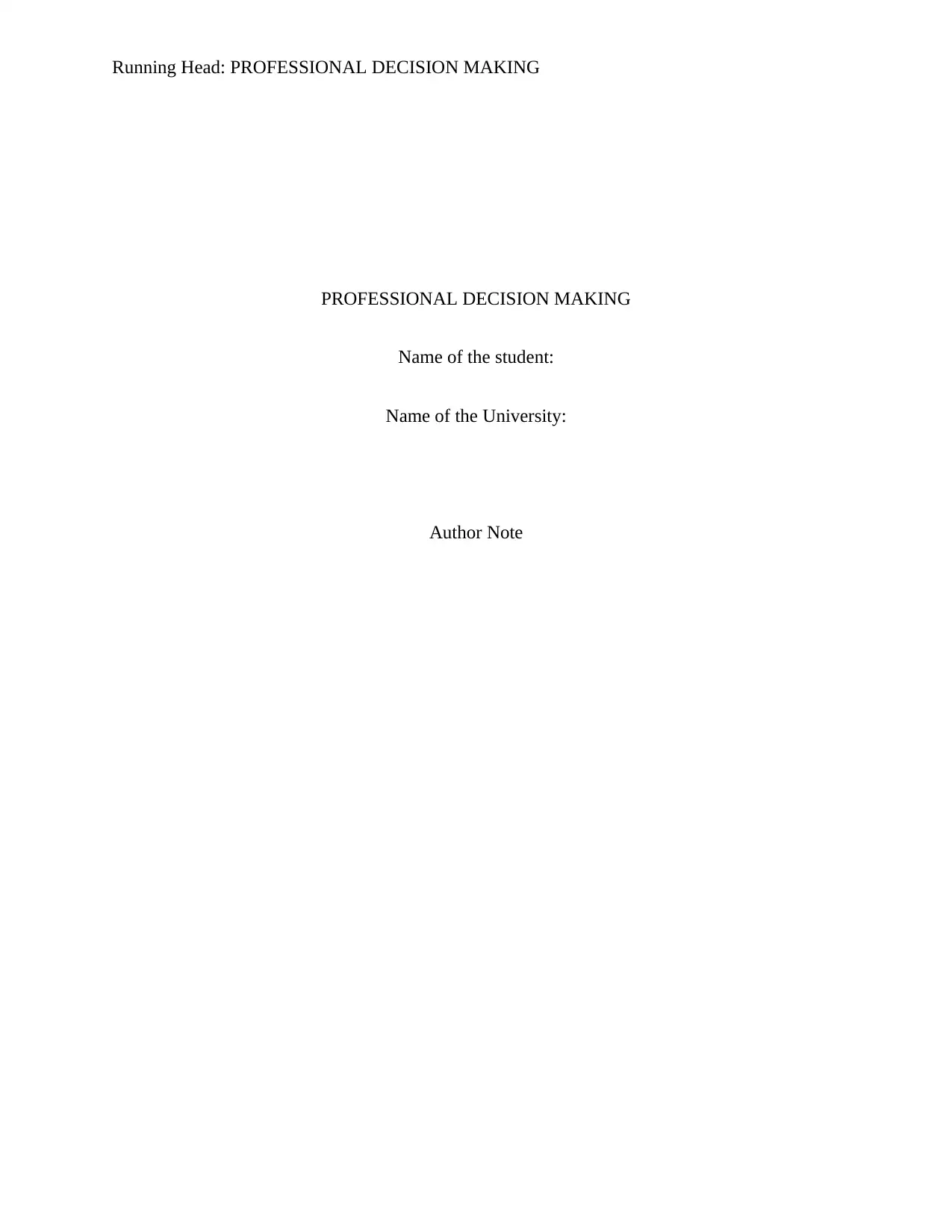
Running Head: PROFESSIONAL DECISION MAKING
PROFESSIONAL DECISION MAKING
Name of the student:
Name of the University:
Author Note
PROFESSIONAL DECISION MAKING
Name of the student:
Name of the University:
Author Note
Paraphrase This Document
Need a fresh take? Get an instant paraphrase of this document with our AI Paraphraser
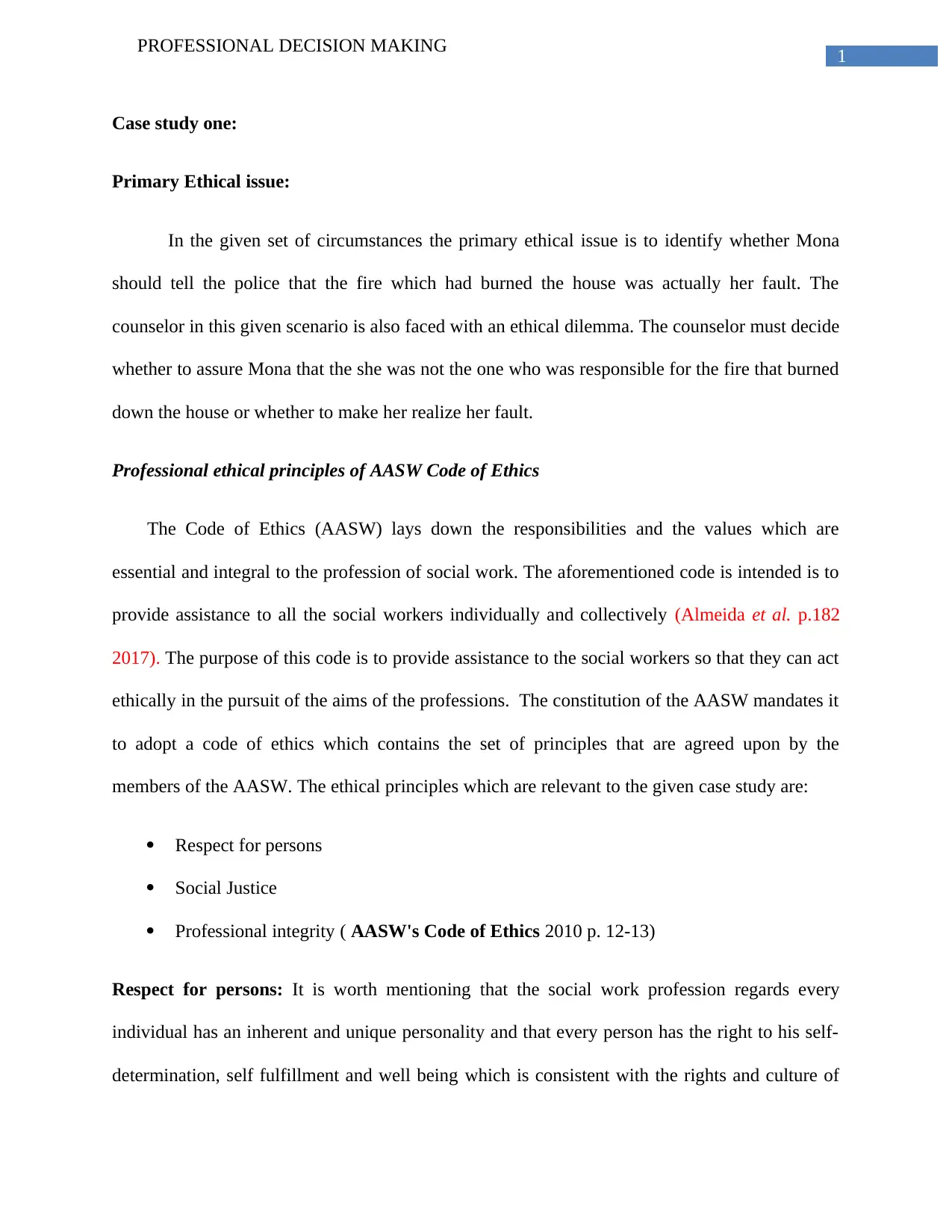
1
PROFESSIONAL DECISION MAKING
Case study one:
Primary Ethical issue:
In the given set of circumstances the primary ethical issue is to identify whether Mona
should tell the police that the fire which had burned the house was actually her fault. The
counselor in this given scenario is also faced with an ethical dilemma. The counselor must decide
whether to assure Mona that the she was not the one who was responsible for the fire that burned
down the house or whether to make her realize her fault.
Professional ethical principles of AASW Code of Ethics
The Code of Ethics (AASW) lays down the responsibilities and the values which are
essential and integral to the profession of social work. The aforementioned code is intended is to
provide assistance to all the social workers individually and collectively (Almeida et al. p.182
2017). The purpose of this code is to provide assistance to the social workers so that they can act
ethically in the pursuit of the aims of the professions. The constitution of the AASW mandates it
to adopt a code of ethics which contains the set of principles that are agreed upon by the
members of the AASW. The ethical principles which are relevant to the given case study are:
Respect for persons
Social Justice
Professional integrity ( AASW's Code of Ethics 2010 p. 12-13)
Respect for persons: It is worth mentioning that the social work profession regards every
individual has an inherent and unique personality and that every person has the right to his self-
determination, self fulfillment and well being which is consistent with the rights and culture of
PROFESSIONAL DECISION MAKING
Case study one:
Primary Ethical issue:
In the given set of circumstances the primary ethical issue is to identify whether Mona
should tell the police that the fire which had burned the house was actually her fault. The
counselor in this given scenario is also faced with an ethical dilemma. The counselor must decide
whether to assure Mona that the she was not the one who was responsible for the fire that burned
down the house or whether to make her realize her fault.
Professional ethical principles of AASW Code of Ethics
The Code of Ethics (AASW) lays down the responsibilities and the values which are
essential and integral to the profession of social work. The aforementioned code is intended is to
provide assistance to all the social workers individually and collectively (Almeida et al. p.182
2017). The purpose of this code is to provide assistance to the social workers so that they can act
ethically in the pursuit of the aims of the professions. The constitution of the AASW mandates it
to adopt a code of ethics which contains the set of principles that are agreed upon by the
members of the AASW. The ethical principles which are relevant to the given case study are:
Respect for persons
Social Justice
Professional integrity ( AASW's Code of Ethics 2010 p. 12-13)
Respect for persons: It is worth mentioning that the social work profession regards every
individual has an inherent and unique personality and that every person has the right to his self-
determination, self fulfillment and well being which is consistent with the rights and culture of
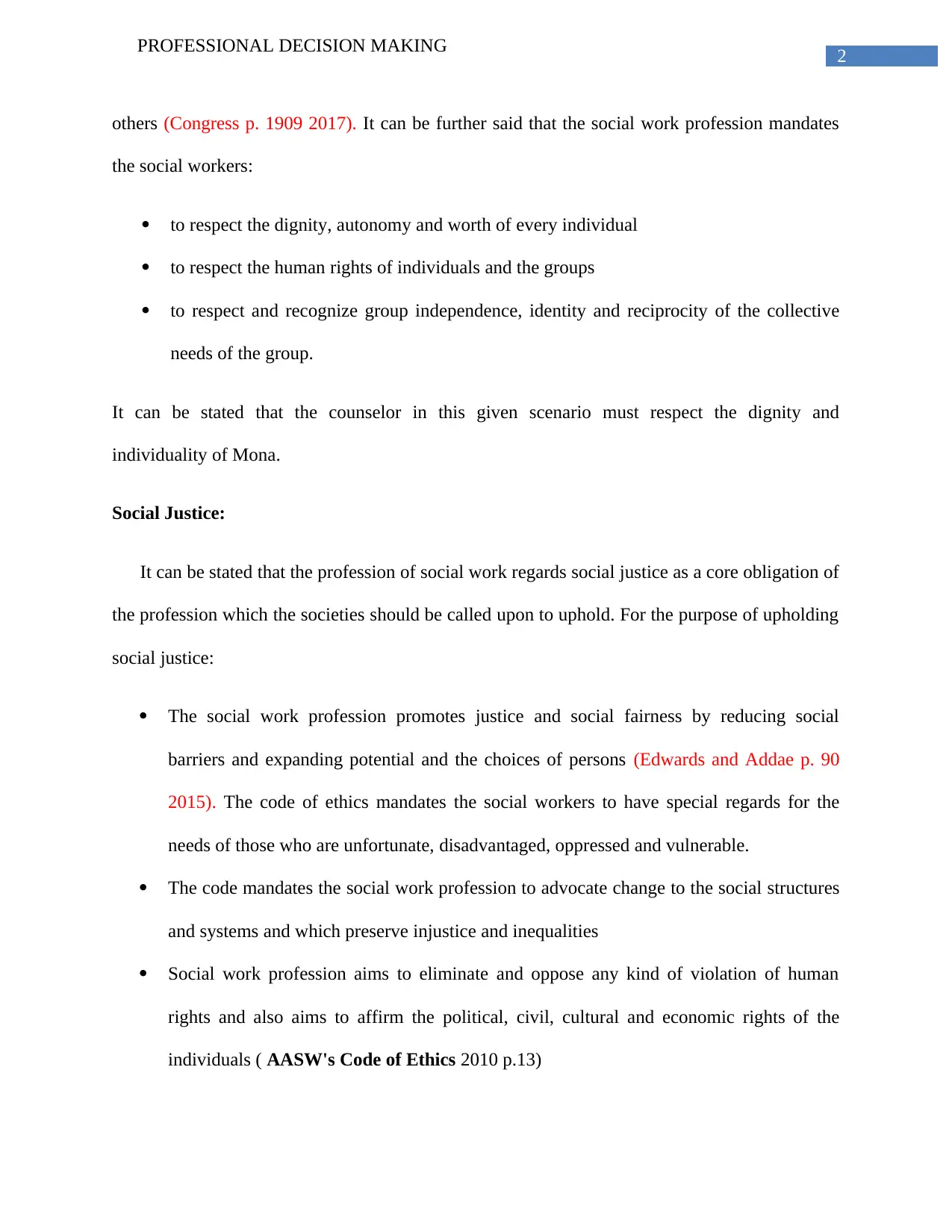
2
PROFESSIONAL DECISION MAKING
others (Congress p. 1909 2017). It can be further said that the social work profession mandates
the social workers:
to respect the dignity, autonomy and worth of every individual
to respect the human rights of individuals and the groups
to respect and recognize group independence, identity and reciprocity of the collective
needs of the group.
It can be stated that the counselor in this given scenario must respect the dignity and
individuality of Mona.
Social Justice:
It can be stated that the profession of social work regards social justice as a core obligation of
the profession which the societies should be called upon to uphold. For the purpose of upholding
social justice:
The social work profession promotes justice and social fairness by reducing social
barriers and expanding potential and the choices of persons (Edwards and Addae p. 90
2015). The code of ethics mandates the social workers to have special regards for the
needs of those who are unfortunate, disadvantaged, oppressed and vulnerable.
The code mandates the social work profession to advocate change to the social structures
and systems and which preserve injustice and inequalities
Social work profession aims to eliminate and oppose any kind of violation of human
rights and also aims to affirm the political, civil, cultural and economic rights of the
individuals ( AASW's Code of Ethics 2010 p.13)
PROFESSIONAL DECISION MAKING
others (Congress p. 1909 2017). It can be further said that the social work profession mandates
the social workers:
to respect the dignity, autonomy and worth of every individual
to respect the human rights of individuals and the groups
to respect and recognize group independence, identity and reciprocity of the collective
needs of the group.
It can be stated that the counselor in this given scenario must respect the dignity and
individuality of Mona.
Social Justice:
It can be stated that the profession of social work regards social justice as a core obligation of
the profession which the societies should be called upon to uphold. For the purpose of upholding
social justice:
The social work profession promotes justice and social fairness by reducing social
barriers and expanding potential and the choices of persons (Edwards and Addae p. 90
2015). The code of ethics mandates the social workers to have special regards for the
needs of those who are unfortunate, disadvantaged, oppressed and vulnerable.
The code mandates the social work profession to advocate change to the social structures
and systems and which preserve injustice and inequalities
Social work profession aims to eliminate and oppose any kind of violation of human
rights and also aims to affirm the political, civil, cultural and economic rights of the
individuals ( AASW's Code of Ethics 2010 p.13)
⊘ This is a preview!⊘
Do you want full access?
Subscribe today to unlock all pages.

Trusted by 1+ million students worldwide
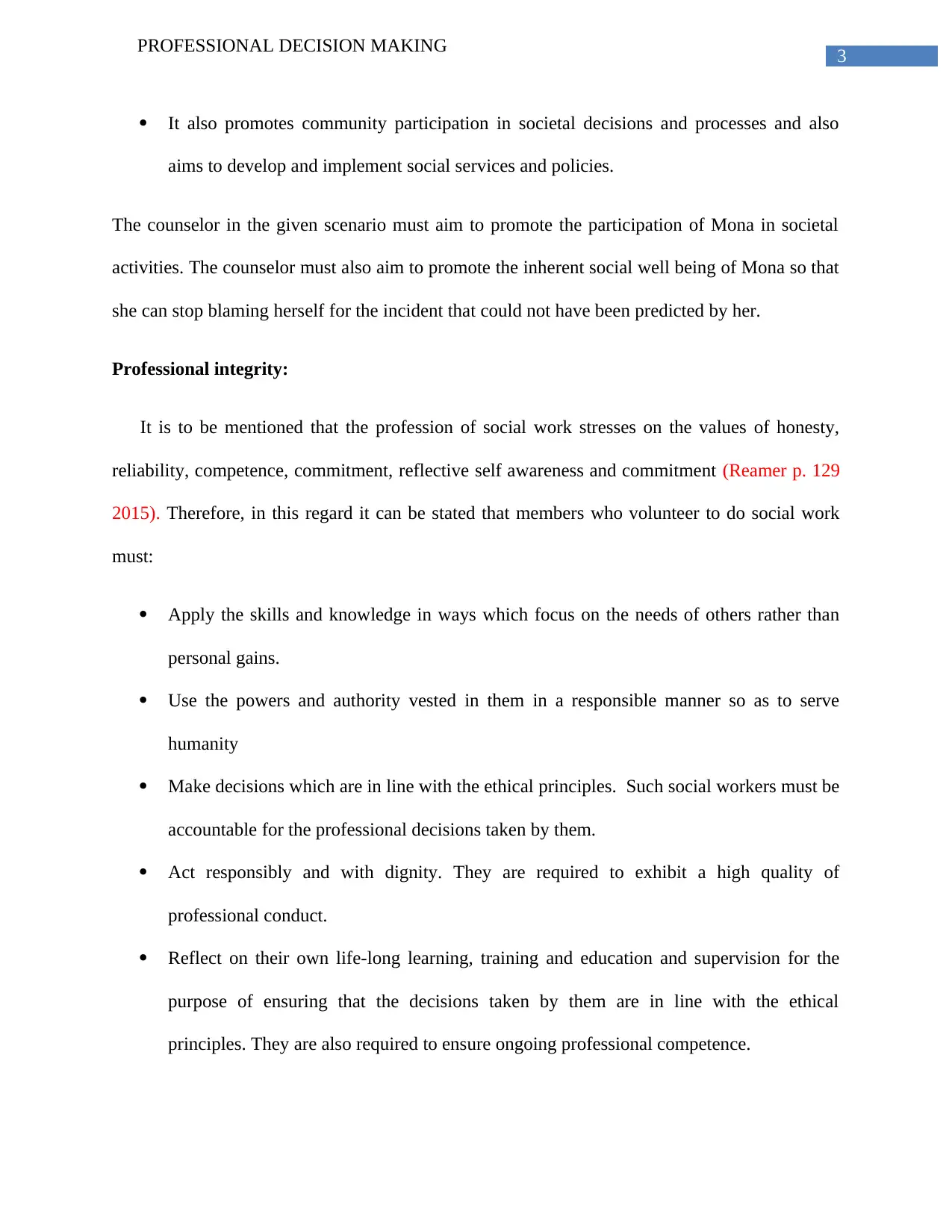
3
PROFESSIONAL DECISION MAKING
It also promotes community participation in societal decisions and processes and also
aims to develop and implement social services and policies.
The counselor in the given scenario must aim to promote the participation of Mona in societal
activities. The counselor must also aim to promote the inherent social well being of Mona so that
she can stop blaming herself for the incident that could not have been predicted by her.
Professional integrity:
It is to be mentioned that the profession of social work stresses on the values of honesty,
reliability, competence, commitment, reflective self awareness and commitment (Reamer p. 129
2015). Therefore, in this regard it can be stated that members who volunteer to do social work
must:
Apply the skills and knowledge in ways which focus on the needs of others rather than
personal gains.
Use the powers and authority vested in them in a responsible manner so as to serve
humanity
Make decisions which are in line with the ethical principles. Such social workers must be
accountable for the professional decisions taken by them.
Act responsibly and with dignity. They are required to exhibit a high quality of
professional conduct.
Reflect on their own life-long learning, training and education and supervision for the
purpose of ensuring that the decisions taken by them are in line with the ethical
principles. They are also required to ensure ongoing professional competence.
PROFESSIONAL DECISION MAKING
It also promotes community participation in societal decisions and processes and also
aims to develop and implement social services and policies.
The counselor in the given scenario must aim to promote the participation of Mona in societal
activities. The counselor must also aim to promote the inherent social well being of Mona so that
she can stop blaming herself for the incident that could not have been predicted by her.
Professional integrity:
It is to be mentioned that the profession of social work stresses on the values of honesty,
reliability, competence, commitment, reflective self awareness and commitment (Reamer p. 129
2015). Therefore, in this regard it can be stated that members who volunteer to do social work
must:
Apply the skills and knowledge in ways which focus on the needs of others rather than
personal gains.
Use the powers and authority vested in them in a responsible manner so as to serve
humanity
Make decisions which are in line with the ethical principles. Such social workers must be
accountable for the professional decisions taken by them.
Act responsibly and with dignity. They are required to exhibit a high quality of
professional conduct.
Reflect on their own life-long learning, training and education and supervision for the
purpose of ensuring that the decisions taken by them are in line with the ethical
principles. They are also required to ensure ongoing professional competence.
Paraphrase This Document
Need a fresh take? Get an instant paraphrase of this document with our AI Paraphraser
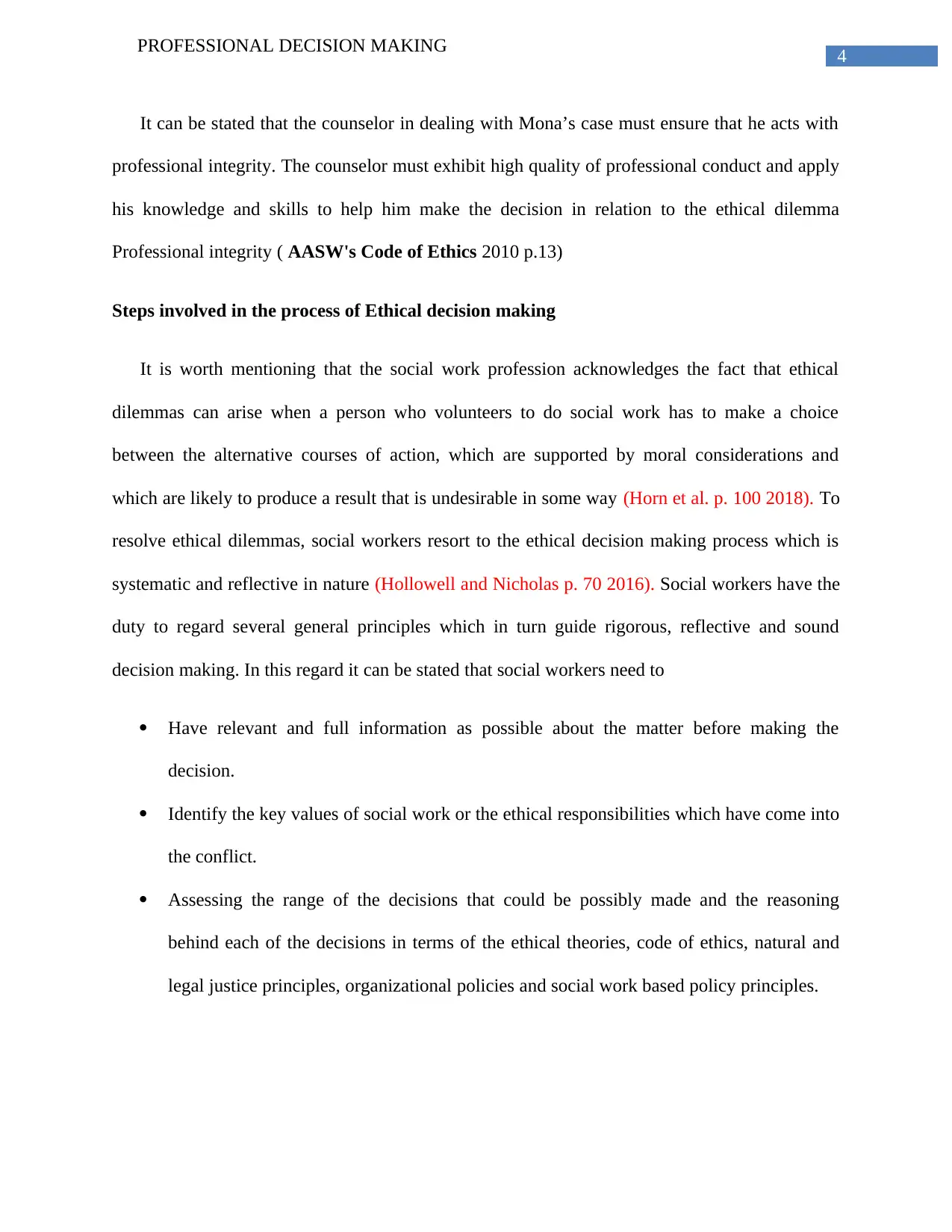
4
PROFESSIONAL DECISION MAKING
It can be stated that the counselor in dealing with Mona’s case must ensure that he acts with
professional integrity. The counselor must exhibit high quality of professional conduct and apply
his knowledge and skills to help him make the decision in relation to the ethical dilemma
Professional integrity ( AASW's Code of Ethics 2010 p.13)
Steps involved in the process of Ethical decision making
It is worth mentioning that the social work profession acknowledges the fact that ethical
dilemmas can arise when a person who volunteers to do social work has to make a choice
between the alternative courses of action, which are supported by moral considerations and
which are likely to produce a result that is undesirable in some way (Horn et al. p. 100 2018). To
resolve ethical dilemmas, social workers resort to the ethical decision making process which is
systematic and reflective in nature (Hollowell and Nicholas p. 70 2016). Social workers have the
duty to regard several general principles which in turn guide rigorous, reflective and sound
decision making. In this regard it can be stated that social workers need to
Have relevant and full information as possible about the matter before making the
decision.
Identify the key values of social work or the ethical responsibilities which have come into
the conflict.
Assessing the range of the decisions that could be possibly made and the reasoning
behind each of the decisions in terms of the ethical theories, code of ethics, natural and
legal justice principles, organizational policies and social work based policy principles.
PROFESSIONAL DECISION MAKING
It can be stated that the counselor in dealing with Mona’s case must ensure that he acts with
professional integrity. The counselor must exhibit high quality of professional conduct and apply
his knowledge and skills to help him make the decision in relation to the ethical dilemma
Professional integrity ( AASW's Code of Ethics 2010 p.13)
Steps involved in the process of Ethical decision making
It is worth mentioning that the social work profession acknowledges the fact that ethical
dilemmas can arise when a person who volunteers to do social work has to make a choice
between the alternative courses of action, which are supported by moral considerations and
which are likely to produce a result that is undesirable in some way (Horn et al. p. 100 2018). To
resolve ethical dilemmas, social workers resort to the ethical decision making process which is
systematic and reflective in nature (Hollowell and Nicholas p. 70 2016). Social workers have the
duty to regard several general principles which in turn guide rigorous, reflective and sound
decision making. In this regard it can be stated that social workers need to
Have relevant and full information as possible about the matter before making the
decision.
Identify the key values of social work or the ethical responsibilities which have come into
the conflict.
Assessing the range of the decisions that could be possibly made and the reasoning
behind each of the decisions in terms of the ethical theories, code of ethics, natural and
legal justice principles, organizational policies and social work based policy principles.
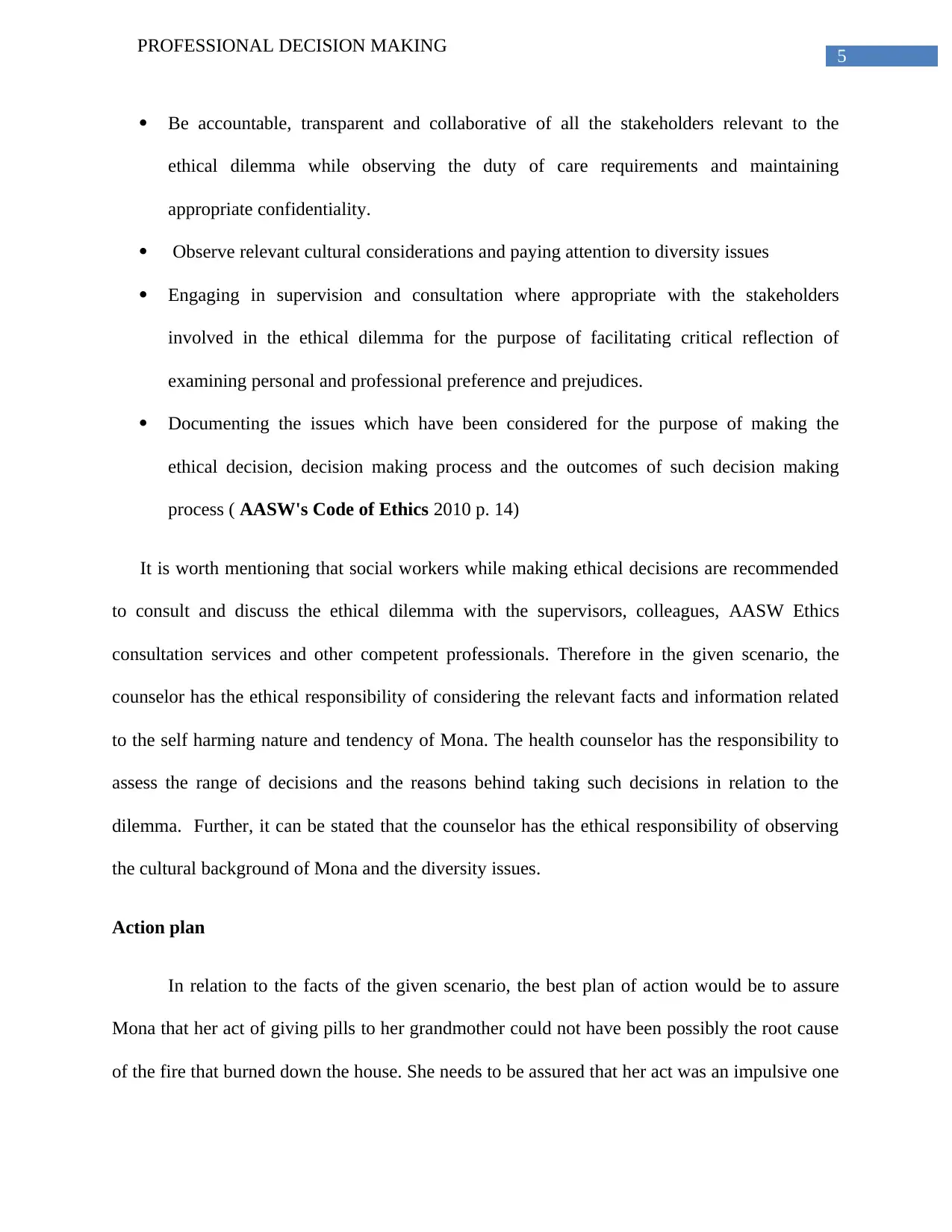
5
PROFESSIONAL DECISION MAKING
Be accountable, transparent and collaborative of all the stakeholders relevant to the
ethical dilemma while observing the duty of care requirements and maintaining
appropriate confidentiality.
Observe relevant cultural considerations and paying attention to diversity issues
Engaging in supervision and consultation where appropriate with the stakeholders
involved in the ethical dilemma for the purpose of facilitating critical reflection of
examining personal and professional preference and prejudices.
Documenting the issues which have been considered for the purpose of making the
ethical decision, decision making process and the outcomes of such decision making
process ( AASW's Code of Ethics 2010 p. 14)
It is worth mentioning that social workers while making ethical decisions are recommended
to consult and discuss the ethical dilemma with the supervisors, colleagues, AASW Ethics
consultation services and other competent professionals. Therefore in the given scenario, the
counselor has the ethical responsibility of considering the relevant facts and information related
to the self harming nature and tendency of Mona. The health counselor has the responsibility to
assess the range of decisions and the reasons behind taking such decisions in relation to the
dilemma. Further, it can be stated that the counselor has the ethical responsibility of observing
the cultural background of Mona and the diversity issues.
Action plan
In relation to the facts of the given scenario, the best plan of action would be to assure
Mona that her act of giving pills to her grandmother could not have been possibly the root cause
of the fire that burned down the house. She needs to be assured that her act was an impulsive one
PROFESSIONAL DECISION MAKING
Be accountable, transparent and collaborative of all the stakeholders relevant to the
ethical dilemma while observing the duty of care requirements and maintaining
appropriate confidentiality.
Observe relevant cultural considerations and paying attention to diversity issues
Engaging in supervision and consultation where appropriate with the stakeholders
involved in the ethical dilemma for the purpose of facilitating critical reflection of
examining personal and professional preference and prejudices.
Documenting the issues which have been considered for the purpose of making the
ethical decision, decision making process and the outcomes of such decision making
process ( AASW's Code of Ethics 2010 p. 14)
It is worth mentioning that social workers while making ethical decisions are recommended
to consult and discuss the ethical dilemma with the supervisors, colleagues, AASW Ethics
consultation services and other competent professionals. Therefore in the given scenario, the
counselor has the ethical responsibility of considering the relevant facts and information related
to the self harming nature and tendency of Mona. The health counselor has the responsibility to
assess the range of decisions and the reasons behind taking such decisions in relation to the
dilemma. Further, it can be stated that the counselor has the ethical responsibility of observing
the cultural background of Mona and the diversity issues.
Action plan
In relation to the facts of the given scenario, the best plan of action would be to assure
Mona that her act of giving pills to her grandmother could not have been possibly the root cause
of the fire that burned down the house. She needs to be assured that her act was an impulsive one
⊘ This is a preview!⊘
Do you want full access?
Subscribe today to unlock all pages.

Trusted by 1+ million students worldwide
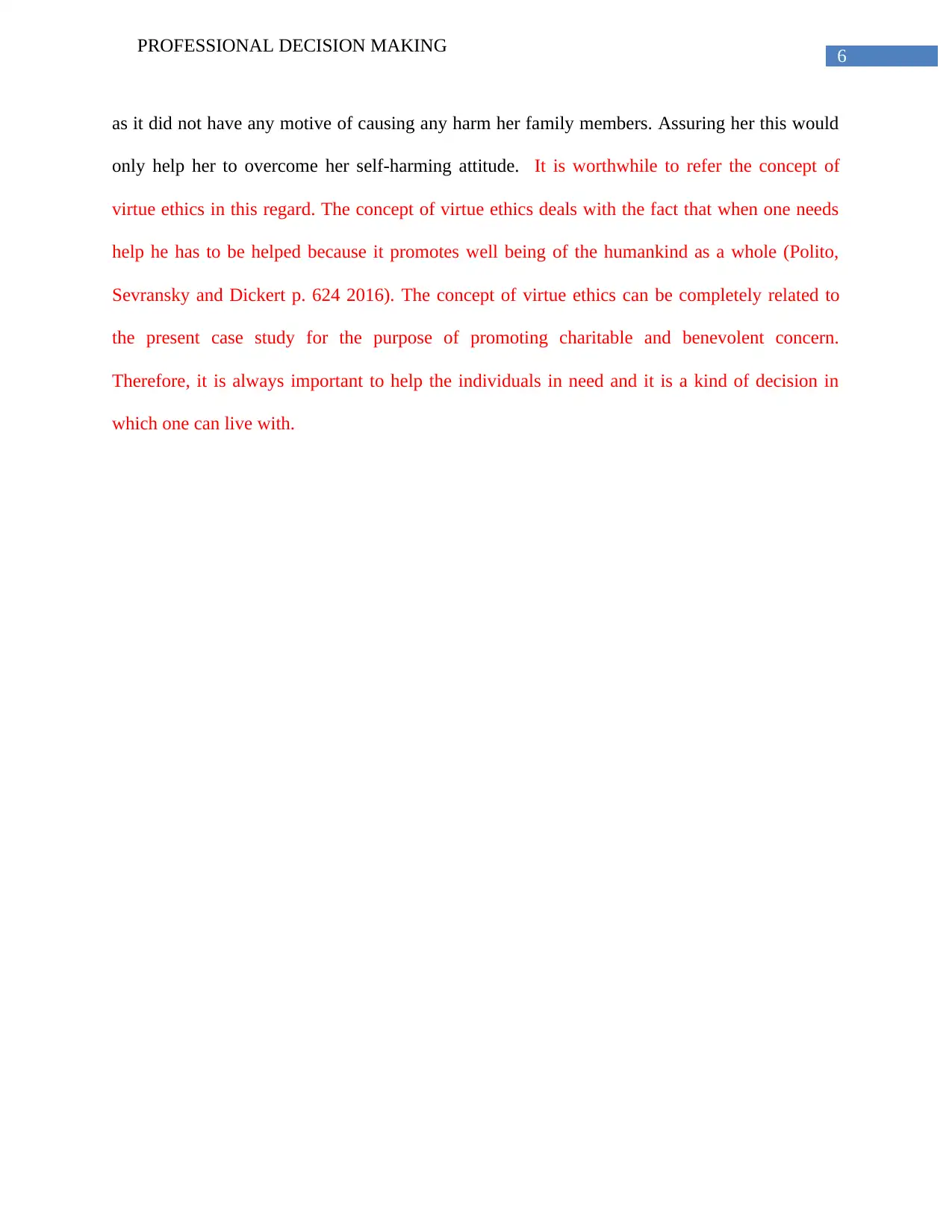
6
PROFESSIONAL DECISION MAKING
as it did not have any motive of causing any harm her family members. Assuring her this would
only help her to overcome her self-harming attitude. It is worthwhile to refer the concept of
virtue ethics in this regard. The concept of virtue ethics deals with the fact that when one needs
help he has to be helped because it promotes well being of the humankind as a whole (Polito,
Sevransky and Dickert p. 624 2016). The concept of virtue ethics can be completely related to
the present case study for the purpose of promoting charitable and benevolent concern.
Therefore, it is always important to help the individuals in need and it is a kind of decision in
which one can live with.
PROFESSIONAL DECISION MAKING
as it did not have any motive of causing any harm her family members. Assuring her this would
only help her to overcome her self-harming attitude. It is worthwhile to refer the concept of
virtue ethics in this regard. The concept of virtue ethics deals with the fact that when one needs
help he has to be helped because it promotes well being of the humankind as a whole (Polito,
Sevransky and Dickert p. 624 2016). The concept of virtue ethics can be completely related to
the present case study for the purpose of promoting charitable and benevolent concern.
Therefore, it is always important to help the individuals in need and it is a kind of decision in
which one can live with.
Paraphrase This Document
Need a fresh take? Get an instant paraphrase of this document with our AI Paraphraser
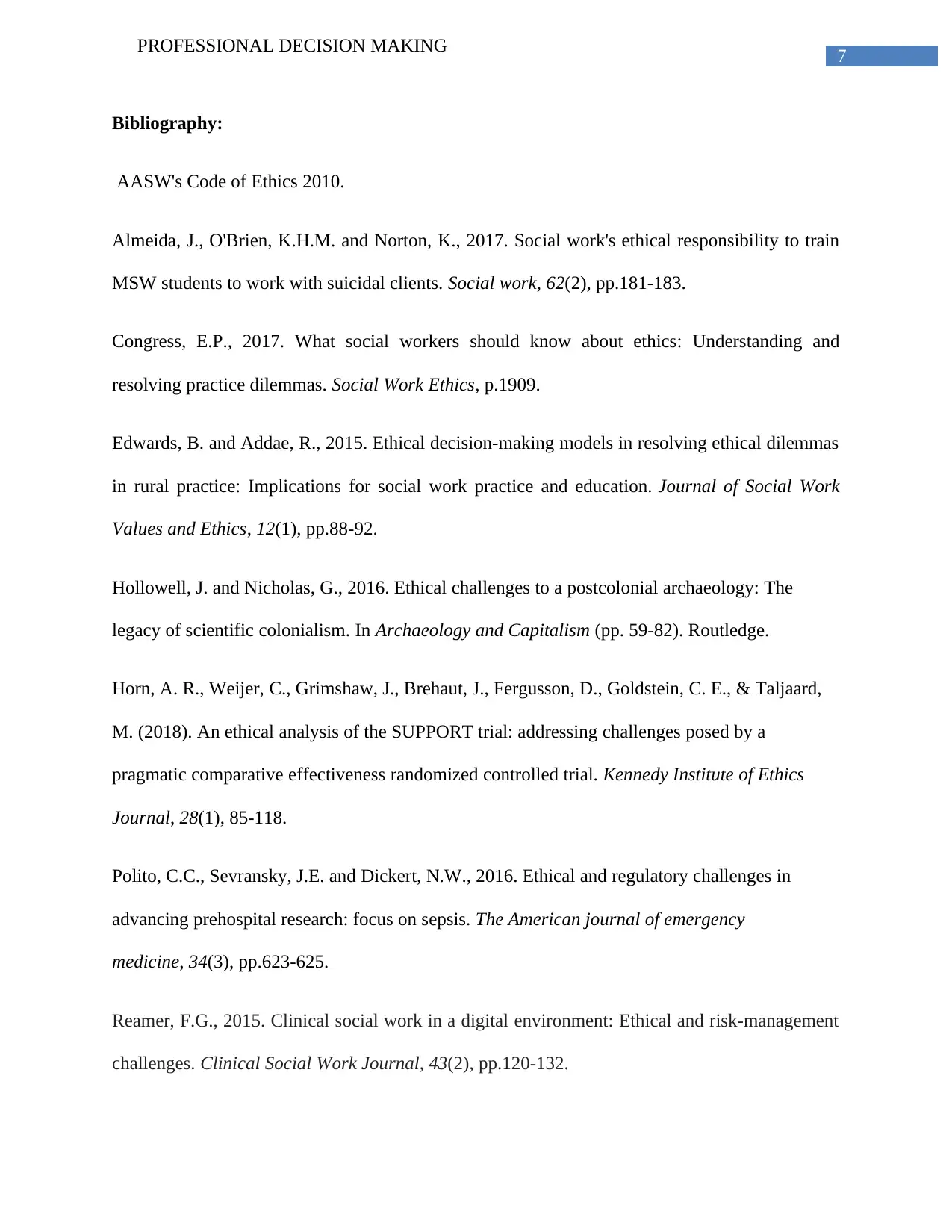
7
PROFESSIONAL DECISION MAKING
Bibliography:
AASW's Code of Ethics 2010.
Almeida, J., O'Brien, K.H.M. and Norton, K., 2017. Social work's ethical responsibility to train
MSW students to work with suicidal clients. Social work, 62(2), pp.181-183.
Congress, E.P., 2017. What social workers should know about ethics: Understanding and
resolving practice dilemmas. Social Work Ethics, p.1909.
Edwards, B. and Addae, R., 2015. Ethical decision-making models in resolving ethical dilemmas
in rural practice: Implications for social work practice and education. Journal of Social Work
Values and Ethics, 12(1), pp.88-92.
Hollowell, J. and Nicholas, G., 2016. Ethical challenges to a postcolonial archaeology: The
legacy of scientific colonialism. In Archaeology and Capitalism (pp. 59-82). Routledge.
Horn, A. R., Weijer, C., Grimshaw, J., Brehaut, J., Fergusson, D., Goldstein, C. E., & Taljaard,
M. (2018). An ethical analysis of the SUPPORT trial: addressing challenges posed by a
pragmatic comparative effectiveness randomized controlled trial. Kennedy Institute of Ethics
Journal, 28(1), 85-118.
Polito, C.C., Sevransky, J.E. and Dickert, N.W., 2016. Ethical and regulatory challenges in
advancing prehospital research: focus on sepsis. The American journal of emergency
medicine, 34(3), pp.623-625.
Reamer, F.G., 2015. Clinical social work in a digital environment: Ethical and risk-management
challenges. Clinical Social Work Journal, 43(2), pp.120-132.
PROFESSIONAL DECISION MAKING
Bibliography:
AASW's Code of Ethics 2010.
Almeida, J., O'Brien, K.H.M. and Norton, K., 2017. Social work's ethical responsibility to train
MSW students to work with suicidal clients. Social work, 62(2), pp.181-183.
Congress, E.P., 2017. What social workers should know about ethics: Understanding and
resolving practice dilemmas. Social Work Ethics, p.1909.
Edwards, B. and Addae, R., 2015. Ethical decision-making models in resolving ethical dilemmas
in rural practice: Implications for social work practice and education. Journal of Social Work
Values and Ethics, 12(1), pp.88-92.
Hollowell, J. and Nicholas, G., 2016. Ethical challenges to a postcolonial archaeology: The
legacy of scientific colonialism. In Archaeology and Capitalism (pp. 59-82). Routledge.
Horn, A. R., Weijer, C., Grimshaw, J., Brehaut, J., Fergusson, D., Goldstein, C. E., & Taljaard,
M. (2018). An ethical analysis of the SUPPORT trial: addressing challenges posed by a
pragmatic comparative effectiveness randomized controlled trial. Kennedy Institute of Ethics
Journal, 28(1), 85-118.
Polito, C.C., Sevransky, J.E. and Dickert, N.W., 2016. Ethical and regulatory challenges in
advancing prehospital research: focus on sepsis. The American journal of emergency
medicine, 34(3), pp.623-625.
Reamer, F.G., 2015. Clinical social work in a digital environment: Ethical and risk-management
challenges. Clinical Social Work Journal, 43(2), pp.120-132.
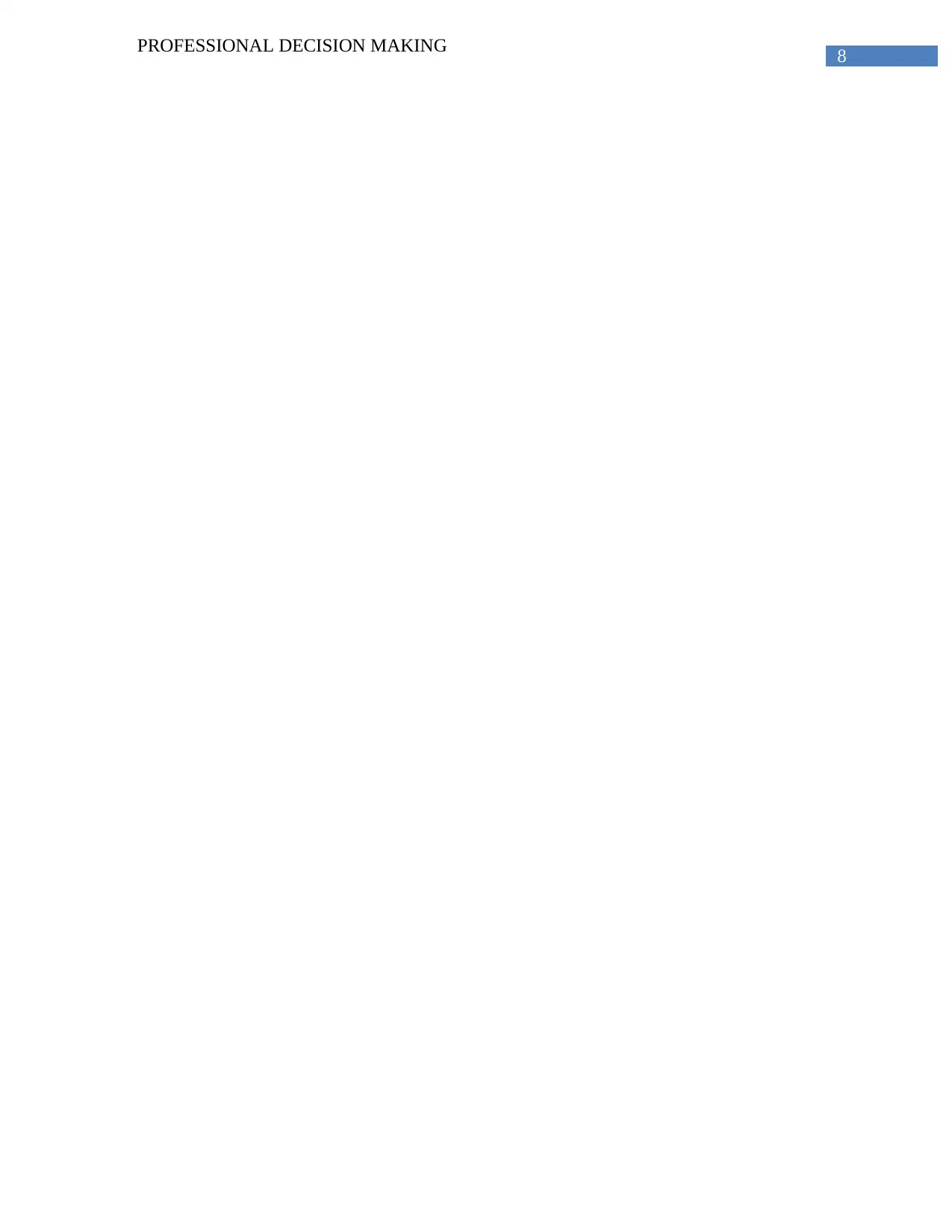
8
PROFESSIONAL DECISION MAKING
PROFESSIONAL DECISION MAKING
⊘ This is a preview!⊘
Do you want full access?
Subscribe today to unlock all pages.

Trusted by 1+ million students worldwide
1 out of 9
Related Documents
Your All-in-One AI-Powered Toolkit for Academic Success.
+13062052269
info@desklib.com
Available 24*7 on WhatsApp / Email
![[object Object]](/_next/static/media/star-bottom.7253800d.svg)
Unlock your academic potential
Copyright © 2020–2026 A2Z Services. All Rights Reserved. Developed and managed by ZUCOL.





